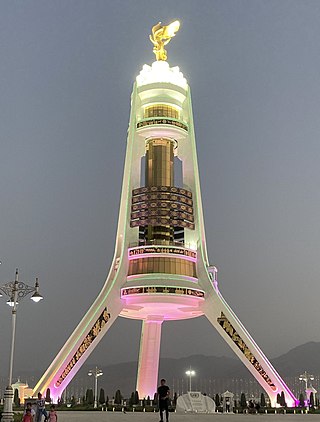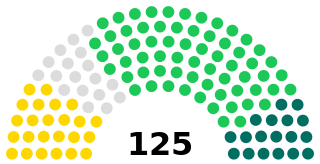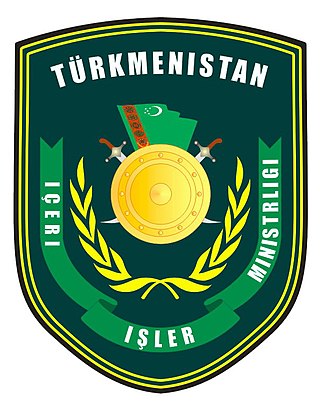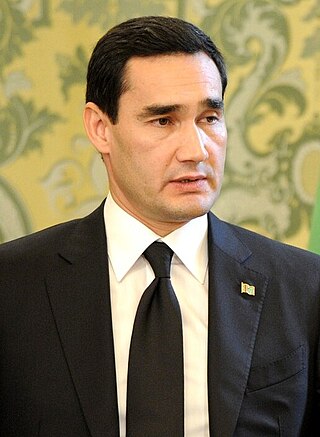| |||||||||||||||||
| |||||||||||||||||
 Results by region | |||||||||||||||||
| |||||||||||||||||
 |
|---|
Presidential elections were held in Turkmenistan on 11 February 2007, following the death of president-for-life Saparmurat Niyazov on 21 December 2006.
| |||||||||||||||||
| |||||||||||||||||
 Results by region | |||||||||||||||||
| |||||||||||||||||
 |
|---|
Presidential elections were held in Turkmenistan on 11 February 2007, following the death of president-for-life Saparmurat Niyazov on 21 December 2006.
After Niyazov's death on 21 December 2006 Acting President Gurbanguly Berdimuhamedow stated that the date for the next presidential election would be announced on 26 December; he also claimed that these elections would be held "on a democratic basis that has been laid by the great leader". [1] On 26 December the People's Council announced that the election would take place on 11 February 2007. [2]
Six candidates were approved out of eleven contenders, all of them members of the Democratic Party: [3]
Current authorities endorsed the Acting President. [5] The candidate nominated by the opposition coalition (whose members are mostly in exile) (led by the Republican Party of Turkmenistan and Watan), Hudaýberdi Orazow, was not approved. [6]
Before the elections, ITAR-TASS claimed that instead of Gurbanow, Durdy Durdyýew, the Deputy Tourism and Sports Minister, would be a candidate in the election. [2] Later reports never mentioned him again and always gave the six candidates named above as the approved candidates, [7] so it seems likely that Durdyýew was only one of the eleven proposed candidates.
At the start of his campaign, Berdimuhamedow promised substantial reforms such as allowing internet access for everyone and revamping the education system, but at the same time vowed to follow Niyazov's footsteps. [8] He also said he would support small business and private ownership, noting that 61% of the economy is in private hands. [9]
Electoral officials in Turkmenistan reported that 95% of voters voted in the election. [10] Radio Free Europe disputes the voter turn-out figures provided by the government, and said that the election was "neither free nor fair". [11] [12] The International Crisis Group described the poll as a "blatantly falsified election". [13]
Seeking to boost voter participation, officials warned inhabitants of Lebap Province that they would not get their monthly flour rations if they failed to vote. [11] At the same time, first-time and elderly voters were promised "gifts" for voting. Later reports indicated that the gift consisted of the late Niyazov's ubiquitous Ruhnama. [11]
Gurbanguly Berdimuhamedow was declared the winner of the election on 14 February, receiving 89% of the vote according to official results, and was sworn in as president immediately afterwards. [14]
| Candidate | Party | Votes | % | |
|---|---|---|---|---|
| Gurbanguly Berdimuhamedow | Democratic Party | 2,357,120 | 89.07 | |
| Amanýaz Atajykow | Democratic Party | 85,016 | 3.21 | |
| Işanguly Nuryýew | Democratic Party | 62,830 | 2.37 | |
| Muhammetnazar Gurbanow | Democratic Party | 62,672 | 2.37 | |
| Orazmyrat Garajaýew | Democratic Party | 40,821 | 1.54 | |
| Aşyrnyýaz Pomanow | Democratic Party | 34,733 | 1.31 | |
| Against all | 3,174 | 0.12 | ||
| Total | 2,646,366 | 100.00 | ||
| Valid votes | 2,646,366 | 99.92 | ||
| Invalid/blank votes | 2,231 | 0.08 | ||
| Total votes | 2,648,597 | 100.00 | ||
| Registered voters/turnout | 2,677,589 | 98.92 | ||
| Source: Government of Turkmenistan | ||||

The history of Turkmenistan traditionally began with the arrival of Indo-European Iranian tribes around 2000 BC. Early tribes were nomadic or semi-nomadic due to the arid conditions of the region, preventing widespread adoption of agriculture. The steppe culture in Central Asia was an extension of a larger Eurasian series of horse cultures which spanned the entire spectrum of language families, including the Indo-Europeans and Turko-Mongol groups. Some of the known early Iranian tribes included the Massagatae, the Scythians/Sakas, and early Soghdians, who were most likely precursors of the Khwarezmians. Turkmenistan was a passing point for numerous migrations and invasions by tribes, which gravitated towards the settled regions of the south, including ancient Mesopotamia, Elam, and the Indus Valley civilization.

The politics of Turkmenistan nominally takes place in the framework of a presidential republic, whereby the President of Turkmenistan is nominally both head of state and head of government. However, as of 21 January 2023 a "national leader" was appointed who chairs an independent People's Council (viz.) with authority to amend the constitution, and who exercises supreme political authority. No true opposition parties are allowed; every registered political party supports the third and current President Serdar Berdimuhamedow. The country is frequently described as a totalitarian state.

Turkmenistan's human rights record has been heavily criticized by various countries and scholars worldwide. Standards in education and health declined markedly during the rule of President Saparmurat Niyazov.

Turkmenistan elects on national level a head of state — the president — and a legislature. The elections in Turkmenistan since its split from the Soviet Union have been widely criticized for being neither free nor fair and attempting to give an appearance of legitimacy to what is in reality a dictatorship. Parties in Turkmenistan are the Democratic Party of Turkmenistan and the Party of Industrialists and Entrepreneurs. The president has a seven-year term, while the legislature has a five-year term.

The president of Turkmenistan, officially the president and chairman of the Cabinet of Ministers of Turkmenistan, is the head of state and head of government of Turkmenistan. The president is also the supreme commander in chief of the Armed Forces of Turkmenistan and heads the State Security Council.

Monument of Neutrality is a monument originally located in Ashgabat, Turkmenistan. In 2010, it was moved to the suburbs. The three-legged arch, which became known locally as "The Tripod", was 75 metres (246 ft) tall and was built in 1998 on the orders of the president of Turkmenistan, Saparmurat Niyazov, to commemorate the country's official position of neutrality. It cost $12 million to construct. The monument was topped by a 12-metre (39 ft) tall gold-plated statue of Niyazov which rotated always to face the sun. The arch was located in central Ashgabat where it dominated the skyline, being taller than the nearby Presidential Palace. The statue was illuminated at night. The arch featured a panoramic viewing platform which was a popular attraction for visitors.

The People's Council of Turkmenistan is Turkmenistan's independent "representative body" exerting supreme constitutional authority. It includes in its membership, but is not considered part of, the legislature. Among other things, it is empowered to amend the constitution. Its chairperson is appointed by the president and is designated the "National Leader". State media referred to the People's Council as the "supreme organ of government authority". From 2018 to 2023 it was the upper chamber of Turkmenistan's Parliament, the "National Council".

The Assembly is the unicameral legislature of Turkmenistan. Between March 2021 and 21 January 2023, it was the lower house of the National Council of Turkmenistan. It consists of 125 members, who are elected for five-year terms in single-seat constituencies.
Öwezgeldi Ataýew is a Turkmen politician. He was the chairman of the Assembly of Turkmenistan from 2002 to 2006. According to the Constitution of Turkmenistan, he was to become the acting president after the death of Saparmurat Niyazov in December 2006. However, the State Security Council of Turkmenistan reported that Atayev was not appointed acting president due to a criminal case started against him. Atayev was charged with abuse of power and human rights violations.

Gurbanguly Mälikgulyýewiç Berdimuhamedow is a Turkmen politician who is currently the chairman of the People's Council of Turkmenistan. He previously served as the 2nd President of Turkmenistan from 2006 to 2022, when he entered into a power-sharing arrangement with his son, Serdar, the current president.
Durdy Durdyýew is the Deputy Tourism and Sports Minister of Turkmenistan. On December 26, 2006, it was falsely announced he was nominated by the People's Council of Turkmenistan to be a candidate in the presidential election scheduled for February 11, 2007. Muhammetnazar Gurbanow, head of the Garabekewul district, was nominated instead.

Saparmurat Atayevich Niyazov, also known as Türkmenbaşy, was a Turkmen politician who ruled Turkmenistan from 1985 until his death in 2006. He was first secretary of the Turkmen Communist Party from 1985 until 1991 and supported the 1991 Soviet coup attempt. He continued to rule Turkmenistan for 15 years after independence from the Soviet Union in 1991.

Presidential elections were held in Turkmenistan on 12 February 2012. They were Turkmenistan's fourth presidential elections and decided who would be the country's president for the next five years. Gurbanguly Berdimuhamedow won with 97% of the vote.

The Ministry of Internal Affairs is the interior ministry or national police force of Turkmenistan. The ministry directly controls the Turkmen police force, consisting of about 25,000 personnel and works with the Ministry for National Security on matters of law enforcement and national defense. The primary tasks of the police force include maintaining law and public security, crime prevention and investigation, passport controlroad and fire safety, and international cooperation in law enforcement. The ministry works with INTERPOL. The current minister is Muhammet Hydyrow. The ministry was founded on February 19, 1998, by decree of President Saparmurat Niyazov “On the formation of the police of Turkmenistan”.

Presidential elections were held in Turkmenistan on 12 February 2017. This was Turkmenistan's fifth presidential election and decided who would be the country's president for the next seven years. Incumbent President Gurbanguly Berdimuhamedow won with more than 97% of the vote, similar to the results of the 2012 elections.

Corruption in Turkmenistan is considered by many independent sources as a serious problem. The country is near the bottom of several annual indices that measure corruption, including The Wall Street Journal's Index of Economic Freedom.

Serdar Gurbangulyýewiç Berdimuhamedow is a Turkmen politician serving as the third and current president of Turkmenistan since 19 March 2022. Berdimuhamedow had previously served in several other positions within the government of his father, Gurbanguly, the long-standing authoritarian ruler of Turkmenistan. The father and son entered into a power-sharing arrangement in 2022 whereby they jointly rule an authoritarian system of government in Turkmenistan.

People's Council elections were held in Turkmenistan on 28 March 2021 to elect 48 of the 56 members of the People's Council or Halk Maslahaty. Another eight were appointed by the president on 14 April 2021.
Shamuhammet Durdylyyev is a Turkmen politician and mayor of the city of Arkadag. He previously served as deputy chairman of the Turkmenistan government for construction and industry and as mayor of Ashgabat, Turkmenistan's capital city. He is currently on the board of directors of the consortium of construction companies responsible for building the "Ashgabat City" residential development.

Early presidential elections were held in Turkmenistan on 12 March 2022. The elections were called after incumbent president Gurbanguly Berdimuhamedow announced his intention to resign.